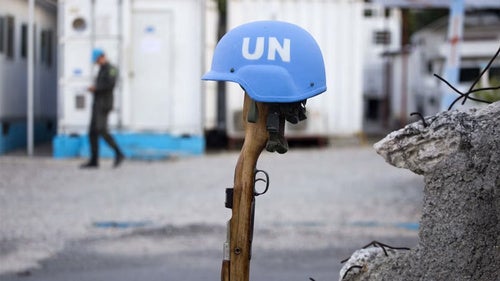Is the UN Doing a Good Job? Just 33% of Americans Think So

The United Nations has been grappling with two global conflicts that it has so far been unable to deescalate – the war in Ukraine and the Israel-Hamas war.
In short: New polling conducted by Gallup between Feb. 1 and 20 finds that, compared to last year, fewer Americans think the United Nations is doing a good job at solving the problems it has to face. The U.N. has been tasked with a growing number of global issues in the last year, including addressing the effects of the mounting climate crisis and dealing with an increasing need for global humanitarian aid. Along with these issues, the U.N. has also been faced with two major conflicts that have proven difficult to deescalate – the war in Ukraine and the Israel-Hamas war.
How has Approval of the UN Changed Among Americans?
When asked the question, “Do you think the United Nations is doing a good job or a poor job in trying to solve the problems it has had to face?,” only one in three Americans (33%) this year told Gallup they think the U.N. is doing a good job. In 2023, 39% of Americans surveyed said the same.
The percentage of Americans that think the U.N. is doing a poor job has held steady at 58% since 2022.
The U.N.’s approval among Americans has not always been this low. In February 2002, nearly six in 10 Americans (58%) surveyed said the group was doing a good job - an all-time high among Gallup’s polling. Since then, though, its approval rating has decreased (albeit not always steadily). Approval of the U.N. dropped to its lowest level among Americans, 26%, in 2009, and since then it has rarely seen approval rates above 40%.
What Global Conflicts has the UN Faced in the Last Year?
Along with the climate crisis and increasing humanitarian needs, the U.N. has been grappling with two global conflicts that it has so far been unable to deescalate – the war in Ukraine and the Israel-Hamas war.
Russia-Ukraine War
In February 2022, after Russia invaded Ukraine, the U.N. Security Council tried and failed to adopt a resolution calling on Russia to end its invasion. Russia, one of the permanent members of the Security Council, used its veto power to prevent the resolution from passing.
Also in February of 2022, Ukraine brought a case to the U.N.’s court, the International Court of Justice, accusing Russia of misusing international genocide law to justify its invasion of Ukraine. Though the ICJ did not immediately rule in that case, it did order Russia in March 2022 to suspend its military operations in Ukraine while the case was under consideration. Russia has ignored that order, and according to the U.N., over 10,000 civilians have been killed in the war as of Feb. 28, 2024.
Nearly a year after Russia’s invasion, the U.N. again tried to put an end to the conflict, passing a General Assembly resolution that demanded Russia withdraw its troops from Ukraine. However, since General Assembly resolutions are not legally binding, Russia was again able to ignore the dictate with relative impunity.
Israel-Hamas War
The U.N. has been equally unsuccessful in its attempts to end the Israel-Hamas war, which started on Oct. 7 when Hamas launched an attack against Israel, killing about 1,200 Israelis and taking more than 200 hostages. In response to the attack, Israel launched a “complete siege” on the Gaza Strip that has now killed at least 29,000 Palestinians, most of them women and children, leading the Associated Press to declare the conflict “the deadliest and most destructive” military campaign in recent history.
The U.N. General Assembly has passed two legally nonbinding resolutions in response to the Israel-Hamas war: One on Oct. 27, 2023, calling for a “humanitarian truce” and one on Dec. 12 calling for an “immediate humanitarian ceasefire.”
The U.N. Security Council has also weighed in on the conflict. The council passed a resolution on Dec. 22 that called for “extended humanitarian pauses and corridors” throughout Gaza to allow aid into the region. Four other resolutions, however, have been vetoed by the Security Council’s permanent members, which include China, the U.S., France, the United Kingdom, and Russia.
A 2002 analysis found that, at the time, at least 91 Security Council resolutions were being ignored. Israel and Turkey were ignoring the most, with 31 and 23 violations, respectively, according to research reported by the Los Angeles Times. Many of the resolutions Israel was ignoring pertained to its occupation of Palestinian territory.
The U.S. was responsible for three of those vetoes: those of an Oct. 18 resolution calling for “humanitarian pauses,” a Dec. 8 resolution that would’ve called for an “immediate humanitarian cease-fire,” and a similar cease-fire resolution from Feb. 20. The U.S. has vetoed resolutions critical of Israel more than any other council member has – 45 times as of Dec. 18, 2023, according to an analysis by Blue Marble.
The ICJ, meanwhile, has taken up two cases involving Israel and the Palestinian territories – an advisory case on the legality of Israel’s occupation of the territories and a case South Africa brought to the court accusing Israel of committing genocide against Palestinians in Gaza.
In January, the ICJ ruled that, for the duration of the case brought by South Africa, Israel must "take all measures within its power to prevent and punish the direct and public incitement to commit genocide" as well as take immediate measures to allow for humanitarian assistance. But the judges stopped short of approving the request to end military action in Gaza, nor did they order a cease-fire.
What Other Factors are Involved in how the UN is Perceived?
Dina Smeltz, senior fellow of public opinion and foreign policy at the Chicago Council on Global Affairs, told Blue Marble, a project of the Council, that the U.N.’s inability to deescalate the wars in Ukraine and Gaza has likely helped shape Americans’ views on the U.N., given how the public has viewed the group’s involvement in past conflicts.
“When we were doing surveys in Bosnia, for example, in the ’90s and the U.N. peacekeepers weren’t able to hold off some aggressive tactics … that definitely had some impact on American views,” she said. “What value does the U.N. have if its peacekeepers can’t even really keep peace?”
Gallup’s polling data also hints at the idea that wars can affect Americans’ perception of the U.N. Respondents’ approval of the U.N.’s handling of international issues took a sharp downward turn in 2003, around the start of the Iraq War, and it remained low for the next several years.
But global conflicts aren’t the only factors that contribute to how the U.N. is perceived by the public. Smeltz said that partisan politics and geographic location also play a role.
Political Affiliation
Smeltz cited political affiliation as a key indicator of U.N. approval among Americans. She said that, after the U.S. war in Iraq, approval for the U.N. took on a partisan split that has persisted.
“People who support the Republican Party tend to more often want to do things alone and think we can do better if we don't have to work with other countries,” Smeltz said. “While Democrats and younger people – I would say younger people also have a higher opinion of the U.N. than older generations – they see more value in working with other countries to solve global problems.”
Location
While not reflected in Gallup’s polling of Americans, Smeltz noted that those in developing nations might possess very different views of the U.N. as they are more likely to come into direct contact with a U.N. agency.
“Americans don't really see how the U.N. touches their daily lives,” Smeltz said. “But in some of these countries, it definitely is a lifeline.”

